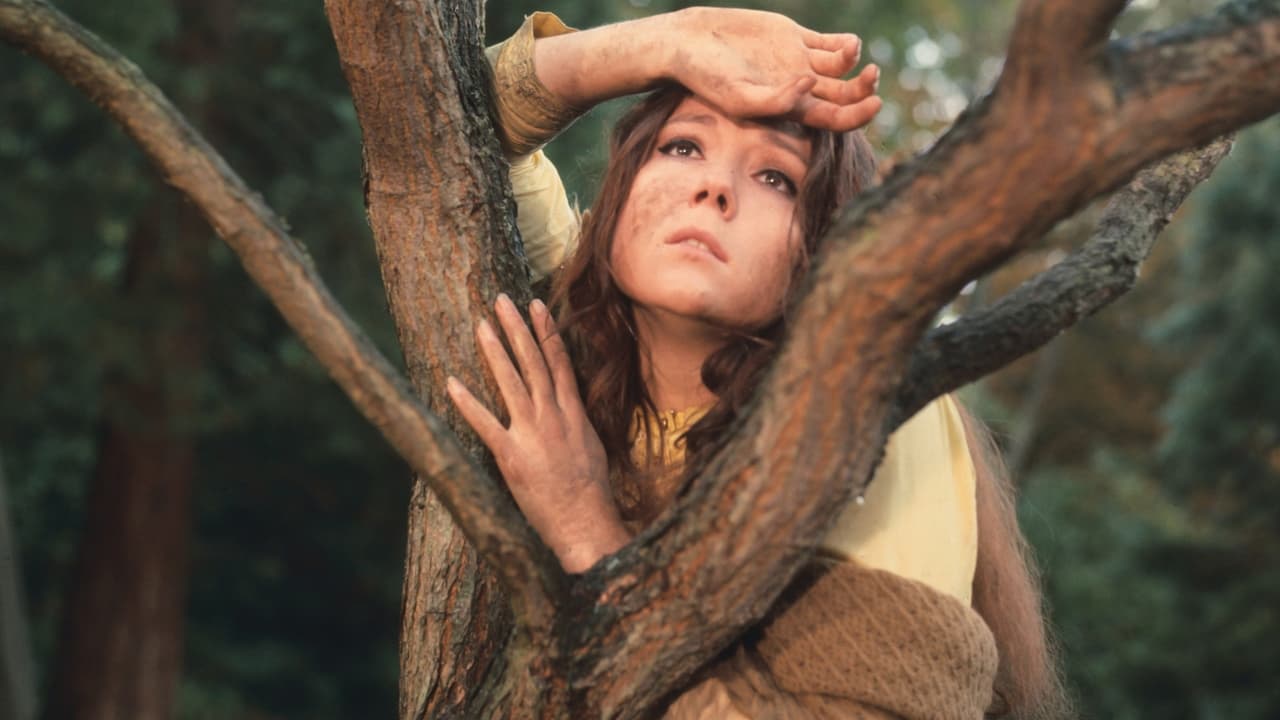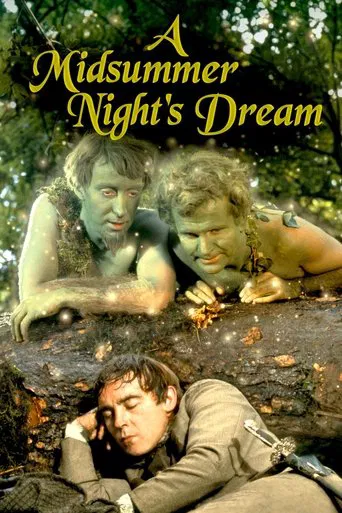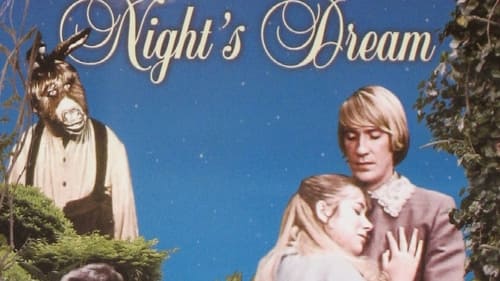


Strong direction and a superb cast make Peter Hall's 1968 version of William Shakespeare's comedy A Midsummer Night's Dream my favorite version of the film, and one of my favorite Shakespeare adaptations of any film. (I understand that the DVD release does not do justice to the film, so if you are renting, I would suggest the VHS version). The film is performed by the Royal Shakespeare Company and the cast is composed of superb actors, many of whom did not become stars until years later. These include: including Judi Dench as the Fairy Queen, a scantily clad Tatania, Diana Rigg as Helena, a young Helen Mirren as Hermia, the lover of Lysander (David Warren), Ian Holm as the inimitable Puck, Paul Rogers as the most believable Bottom I've seen, and Ian Richardson as the Fairy King Oberon.While the film had a limited budget, the clarity of its presentation may be one of the few adaptations of the Bard that doesn't need subtitles to fully appreciate Shakespeare's poetry. As far as the story, it is a light-hearted and enchanting comedy that uses magic to create a mysterious, mystical atmosphere,. Shakespeare populates the woods outside of Athens with mischievous, but good hearted fairies who mistakenly create unnecessary conflict, then make amends. The supernatural is the essential element that runs throughout the play and Shakespeare uses magic both to confuse the characters, and then resolve their bewilderment. Each character experiences the magic differently. Bottom finds his wondrous dreams to be magical, while the lovers, arguably the most impacted by magic, remember it only as a bad dream. Titania finds magic in her love of a little boy, and Oberon embraces the magic of the supernatural elements in the seemingly natural world. In this play, Shakespeare suggests that the world of the magical fairies is not separate from nature, but a part of it, even though Hall separates the fairies from the rest of the characters by depicting them in shades of green. A Midsummer Night's Dream also displays the author's knowledge of Greek mythology by characters such as Theseus, the Duke of Athens, a mythical founder-king of Athens, and his bride Hippolyta, an Amazonian queen who owned a waist belt that signified her authority as queen of the Amazons. Additionally, two other characters, Oberon and Titania, can be seen as similar to Zeus and Hera, and Puck can be compared to Eros, the Greek god of sexual love and beauty with the flower that Puck puts on characters' eyes is comparable to Eros' golden arrows. The play also owes a large debt to Ovid's "Metamorphoses," likely used in the translation by Arthur Golding, the uncle of Edward de Vere, the Earl of Oxford. The early 20th century delineator of classical mythology, Robert Kilburn Root, says that the whole character of Shakespeare's mythology is essentially Ovidian and that "Shakespeare himself has shown that he was proud to be Ovid's successful ape." As in Ovid's use of a story-within-a story, Shakespeare uses the tale of Pyramus and Thisbe as a play-within-a play for entertainment at the wedding of Theseus and Hippolyta, a rollicking good time. Metamorphosis, a theme central to Ovid is clearly represented by Bottom's transformation into an ass. "Man is but an ass if he go about t'expound this dream," he says, unable to fathom the magical happenings that have affected him as anything but the result of sleep. Shakespeare is also interested in the actual workings of dreams, in how events occur without explanation, time loses its normal sense of flow, and how the impossible occurs as a matter of course. One aspect of the play, not often noted, is how Shakespeare's depiction of women challenged the convention of the time. Hippolyta's role in her relationship with Theseus is striking. The fact that she stands up to Theseus when she disagrees with him in Act V is extremely significant. In Shakespeare's time, it was common practice for the wife to be the submissive, silent partner in a relationship. Hippolyta's first words in the play evidence the prevalence of dreams ("Four days will quickly steep themselves in night, / Four nights will quickly dream away the time"), and various characters mention dreams throughout (Act 1, Scene 1). Animal spirits also pervade the play, including references to owls, ravens, and spiders. In Act 2, Scene 2, Puck delivers a charm to protect the sleeping Titania from tiny creatures common in England associated with the fates, the weaver of illusion, and the women who wove the threads of life, all harmless, though once thought to be venomous."Weaving spiders, come not here; Hence, you longlegged spinners, hence! Beetles black approach not near; Worm nor snail, do no offence."At the end of the play, Puck extends the idea of dreams to the audience members themselves, saying that, if they have been offended by the play, they should remember it as nothing more than a dream. In spite of being a product of the 60s with its mini-skirts and boots, A Midsummer Night's Dream has a fresh and contemporary look and audiences of today would feel right at home with the film's use of jump cuts, and and-held camera (presumably a debt to director Richard Lester). It is a "feel-good" story that is neatly resolved but I certainly would not have wanted it to be any other way, and I suspect Elizabethan audiences would not have either.
... View MoreThis spectacular film is currently experiencing a rebirth on cable TV this month, I've seen it listed several times, in its' completed version, without having the aggravation of commercials or editing. When viewed in it's entirety, you'll gasp and squeal with delight at how so many of these budding young English Shakespearean actors became legends in their chosen field decades later.. A fresh and youthful Judi Densch is spectacular, along with the always sexy David Warner, but Diana Rigg's performance is the one that hammers home the reason why this stunning and statuesque actress was the darling of the 60's and 70's in the acting community in Britain. I'm sure so many of these performers, who'd already made a name for themselves in the Shakespeare community later became absolute legends in film and stage. I was hoping to see a youthful Alan Rickman or Maggie Smith, but beggars can't be choosers... Highly recommended and if you get a chance to watch it on the Hi-Def channels on cable, take the phone off the hook and stock up on the mead...
... View MoreTHere are three British dames in this film adaptation: Dame Judi Dench, Dame Diana Rigg and Dame Helen Mirren. While the cast is outstandingly directed by Sir Peter Hall, the costumes appear to be weak and cheaply made. When Titania played by Dame Judi Dench kisses a horses' behind, you can see his eyes. The costumers dressed Titania as a green fairy which was just painted on like silly. The William Shakespeare play is a festive comedy for the light-hearted and entertainment of its audience. It's not an expensive production but it's worth watching to see three Dames in their younger days. Everybody in the cast has been part of the Royal Shakespeare Company and are veteran actors by now. THe play does entertain and I can poke fun at the cheap costumes and lack of expense towards the production. It's nice to see Dame Judi Dench before she was ever a Dame. Not even an O.B.E. in this 1968 production. She appears to enjoy playing the role. Dame Helen Mirren is also cast as the young Helena who seeks to be in love. I probably got the names wrong but it's Shakespeare, who can remember?
... View MoreThis rendition is somewhat 60ish but its my personal favorite. If you can set that aside, the acting is first rate and I think some of the best performances are delivered. Peter Hall's use of the hand-held camera keeps the movie very interesting and constantly moving.The cast is unmatched in any other Midsummer production with Diana Rigg, Ian Richardson, and Judi Dench. My favorite is Ian Holm's rendition of Puck ... truly memorable. Paul Rodgers is also stellar as Bottom and is certainly the best Pyramus and Thisbee ive seen in any of the renditions.
... View More